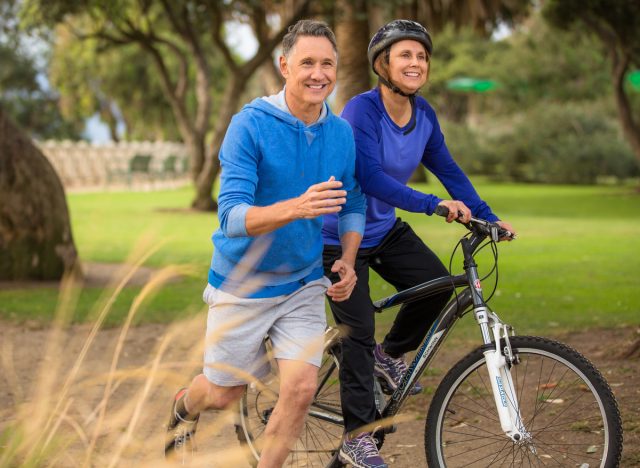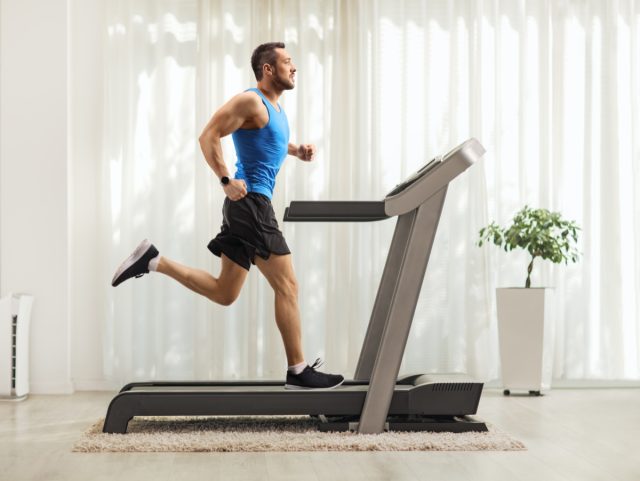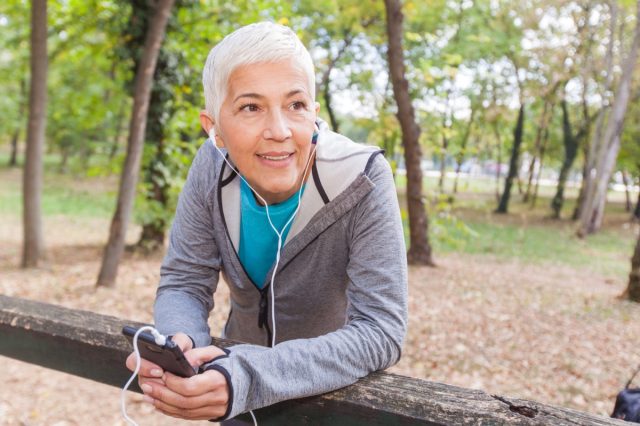5 Major Benefits Of Kicking Up Your Cardio, Science Says

If you enjoy activities like walking your dog or going for a bike ride, then guess what? Those are all forms of aerobic exercise, or “cardio.” “Almost any movement can be considered cardiovascular exercise if it raises your heart rate and gets your blood pumping,” explains Susan Bentley, CPT, a trainer and group fitness instructor at 24 Hour Fitness in Folsom, California. “This is generally done through repetitive, rhythmic movement that incorporates large muscle groups like the legs or back. Of course, traditional things like running, rowing, or a yoga class qualify, but so do activities like playing tag with your kids and climbing the stairs in your house,” she says.
Broadly speaking, when done consistently (a minimum of 2.5 hours a week for adults), aerobic exercise can improve many of our body’s systems to keep us healthy. “This includes our cardiovascular, respiratory, and circulatory systems,” Bentley says. “These benefits have a ripple effect that can progressively make a significant difference to your overall well-being.” Read on to learn about some of the ways cardio can improve your health, according to Bentley and scientific researchers.
(It’s critical to note that if you have health issues, you should talk to your doctor before beginning a cardio exercise routine. Once you get the okay, Bentley advises starting slowly and taking breaks as needed. “If you don’t know how to get started on your fitness journey, visit a gym like 24 Hour Fitness,” Bentley says. “Fitness professionals can point you in the right direction, help you explore cardio equipment and a wide variety of fun group fitness classes.”)
Next up, be sure to check out The 6 Best Exercises for Strong and Toned Arms in 2022, Trainer Says.
It can improve your brain health and ward off dementia

While your brain isn’t doing any heavy lifting while you use the elliptical or salsa through a cardio dance class, it’s garnering a ton of benefits. “All forms of exercise, including cardio, can spark new growth of blood vessels in the brain, which can improve memory and prevent cognitive decline. Exercise can also [make] the hippocampus [be greater in size], which is responsible for learning and memory,” Bentley explains. And when you specifically look at the science around brain health and cardio, there is a ton that backs up Bentley’s points—and then some. For starters, consider this study out of Germany that found that better cardiorespiratory fitness is linked to a higher volume of grey matter, which is the brain’s outermost layer. It plays a role in many motor and cognitive functions, including memory.
Most impressively, though, researchers have found that cardio can help ward off dementia. One Neurology study of over 1,000 women found that those who had “high cardiovascular fitness” in middle age were roughly 88% less likely to develop dementia than their peers who only had “medium fitness.” While this study only looked at women, other research has indicated similar findings.
Related: Two Major Benefits of Running Just 10 Minutes a Day, New Study Says
It can help ward off cardiovascular disease (CVD)

CVD is “the leading cause of death” in the United States, according to the Centers for Disease Control and Prevention, so it’s beneficial knowing that cardiovascular exercise helps ward off cardiovascular disease.
While any form of fitness can protect us from CVD, a study published in The American Journal of Cardiology concluded that aerobic training is the most effective type of exercise for improving metabolic syndrome-related health issues. According to Bentley, to reap the benefits, discover an aerobic workout you enjoy, and make a commitment to it at least twice a week. “Being consistent trains the heart to become more efficient. With each workout, the heart gets better at pumping oxygenated blood to our muscles and organs. It also gets better at working with the respiratory system to transfer carbon dioxide and life-giving oxygen,” Bentley explains. “Over time, this reduces your resting heart and breathing rate, improving cardiovascular health.”
Related: What “Plogging” Does To Your Body Makes It Such An Effective Workout
It can help strengthen the immune system

To be clear, no form of exercise can magically ward off a cold or shied you from COVID-19 or any other illness. But aerobic exercise can help strengthen the immune system so that it’s primed to fight off germs when they invade. One study, for example, found that exercising from regular to moderate levels results in positive effects on your immune system via higher levels of immunoglobulins, which are key factors in protecting your body from viruses and bacteria.
It helps regulate mood, stress levels, and anxiety

Next time you’re feeling stressed or anxious, resist the urge to binge on Netflix, and consider doing some cardio instead. “Cardio is easy, fun, boosts mood, and offers mental health benefits by [decreasing] levels of stress hormones like cortisol and adrenaline,” Bentley explains. “Aerobic exercise also increases blood flow and oxygen, which are other factors that could help us feel better.”
Research led to our understanding of the connection between mood and cardio, like this study of 1.2 million people. After crunching the numbers, researchers found that, on average, regular exercisers have 1.5 less “poor mental health” days compared to non-exercisers, with those doing aerobic workouts reaping the most benefits.
In addition, this study in the journal Menopause looked at data from pre- and post-menopausal women. Those who got more physical activity through activities like yard work, walking, and cycling scored higher on measures of positivity and lower on scales of depressive symptoms than women who exercised less often.
It can even help you live longer

Impressive, right? Research shows that those who follow the Physical Activity Guidelines for Americans (at least 2.5 hours of moderate-intensity cardio) have a significantly reduced risk of death from any cause. This makes sense, considering aerobic exercise can reduce the risk of developing conditions that top the morbidity list, including cancer and heart disease.
The bottom line: Even if it’s just 10 or 15 minutes a day, it’s definitely worth your time to squeeze in some cardio. Your future self will thank you!









